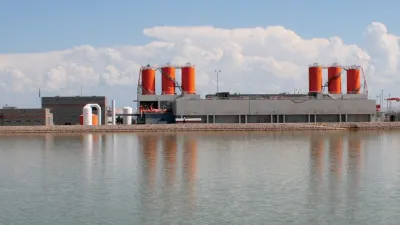Much of the inefficiency surrounding our use and misuse of water derive from entrenched habits formed during previous eras of presumed inexhaustibility of water supplies. Our wastewater treatment approach has traditionally relied on an infrastructure of centralized municipal water plants where tertiary effluent is recycled. These plants consume considerable energy and cost to restore all of the water they process.
Much of the inefficiency surrounding our use and misuse of water derive from entrenched habits formed during previous eras of presumed inexhaustibility of water supplies. Our wastewater treatment approach has traditionally relied on an infrastructure of centralized municipal water plants where tertiary effluent is recycled. These plants consume considerable energy and cost to restore all of the water they process.
This habitual approach to managing water warrants more thoughtful strategies. These could include selectively treating wastewater to different levels of purity based on the varying levels of water purity for specific purposes rather than defaulting to the established approach of one-size-fits-all centralized wastewater treatment.
One emerging strategy of leveraging the efficiency of wastewater treatment is the application of the value park concept. Borrowing from the symbiotic relationship between petrochemical operations and the need for high volume, low cost manufacturing, value parks have become the norm by clustering around the edges of refineries and tank farms in a unified manner to use tertiary chemicals and byproducts to produce everyday household consumer products such as plastics and cosmetics. This consolidation of activity and energy reduces carbon impact of the manufacturing process and uses byproducts that normally would go to waste.
Expanding on the concept, a ‘wastewater value park' envisions a micro-economy of water-dependent business clustered in many urban environments, including local nurseries, small industrial parts manufacturers (aviation, auto) and select processing plants that require less pure water for a variety of purposes from cooling to plating. By integrating our wastewater treatments plants as a catalyst for urban redevelopment, economic opportunity, job creation and environmental stewardship can emerge.
Instead of viewing wastewater treatment plants as isolated facilities, we should look forward to the day when more communities will proudly regard such places as integrators of advanced water technology that helps fulfill the as many goals as possible to change the way cities are built the future.

Planetizen Federal Action Tracker
A weekly monitor of how Trump’s orders and actions are impacting planners and planning in America.

Restaurant Patios Were a Pandemic Win — Why Were They so Hard to Keep?
Social distancing requirements and changes in travel patterns prompted cities to pilot new uses for street and sidewalk space. Then it got complicated.

Map: Where Senate Republicans Want to Sell Your Public Lands
For public land advocates, the Senate Republicans’ proposal to sell millions of acres of public land in the West is “the biggest fight of their careers.”

Maui's Vacation Rental Debate Turns Ugly
Verbal attacks, misinformation campaigns and fistfights plague a high-stakes debate to convert thousands of vacation rentals into long-term housing.

San Francisco Suspends Traffic Calming Amidst Record Deaths
Citing “a challenging fiscal landscape,” the city will cease the program on the heels of 42 traffic deaths, including 24 pedestrians.

California Homeless Arrests, Citations Spike After Ruling
An investigation reveals that anti-homeless actions increased up to 500% after Grants Pass v. Johnson — even in cities claiming no policy change.
Urban Design for Planners 1: Software Tools
This six-course series explores essential urban design concepts using open source software and equips planners with the tools they need to participate fully in the urban design process.
Planning for Universal Design
Learn the tools for implementing Universal Design in planning regulations.
Heyer Gruel & Associates PA
JM Goldson LLC
Custer County Colorado
City of Camden Redevelopment Agency
City of Astoria
Transportation Research & Education Center (TREC) at Portland State University
Camden Redevelopment Agency
City of Claremont
Municipality of Princeton (NJ)




























